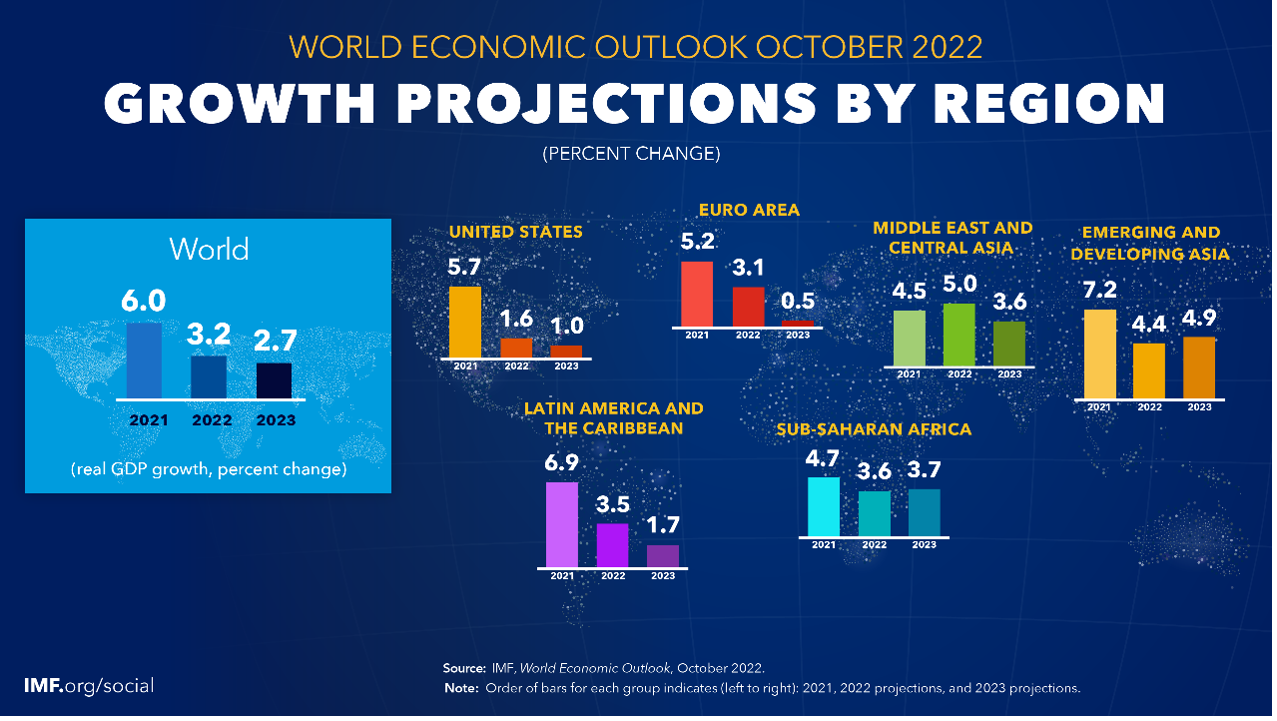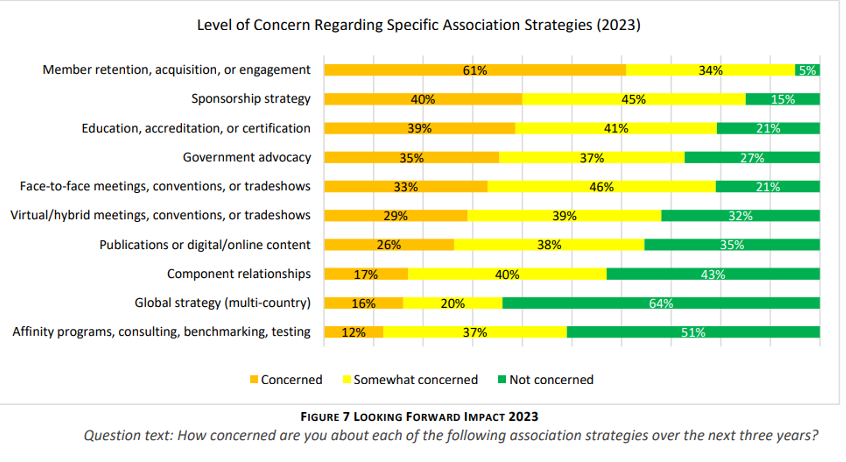As CIPE embarks on its 40th year of service to chambers of commerce and business associations around the world, we pause to look at the tremendous challenges and opportunities for business membership organizations that lie ahead. Here are some of the top issues and trend lines that stand out.
Braving Challenging Economic Headwinds
The IMF predicts anemic growth, at a level not seen in more than 20 years (other than during two distinct periods of crisis.) At the same time, inflation is putting pressure on organizations’ finances, and of course on their members. The possibility of a global recession looms large. Chambers and associations are needed by their members in such times more than any other, for the valuable services they provide and their advocacy for smart policy measures that can help them weather an economic downturn. Membership organizations have to prove their worth in this regard. Retaining and signing new members under such conditions will be hard-earned, and not to be taken for granted.
FiscalNote’s 2023 Industry Report on the State of Government Affairs and Advocacy reveals that organizations finding ways to show their ROI more than any other measure to prepare for a possible recession. The good news is that organizations underwent a serious stress test during the COVID-19 pandemic, and performed remarkably well, with increases in membership and member engagement. The experience of CIPE’s global partner network in emerging economies has borne this out as well.

Adapting To New Operational Realities
In 2022, organizations shifted from remote operations due to pandemic related restrictions, to more of a hybrid model. Employees are increasingly looking for flexibility in terms of when, where, and how they work. Meanwhile, members have become accustomed to hybrid events and other offerings that give them the flexibility to access services at home or on the go. Chambers of commerce, which typically have a greater commitment to a physical space, but trade associations as well, will grapple with decisions surrounding what space is necessary and how best to utilize it. There is no one right answer or one-size-fits-all solution. In one chamber that CIPE helped establish during the pandemic, the question arose whether permanent office space was necessary at all. The baseline for convening the board of directors to carry out its governance functions has also been reset to hybrid for many organizations, providing a new dynamic for the work of the board.
Embracing the Future of Membership
For some time, the motivation to join a business membership organization has been shifting from altruistic, community-oriented reasons to a greater focus on value and ROI (return on investment). Not that being part of a larger community and giving back for the public good are obsolete by any means, but business owners expect to receive valuable benefits and services from joining their chamber or association. We observe this trend among CIPE’s partners in emerging markets as well, as the leadership of (primarily family-owned) companies (and their associations) pass from one generation to the next. Members expect their associations to move with speed, to engage them through modern modes of communication, and to be served with relevant and timely activities. There is also increased competition from for-profit organizations that are looking to disrupt the industry and seize market share. For good reason, member retention, acquisition, and engagement is by far the greatest concern to association executives according to some studies.

Confronting Threats To Organizing and Closing Civic Space
Ascendant authoritarianism, a global phenomenon, presents a challenge to organized business. Often the threat from authoritarian regimes towards human rights activists and labor unions is more obvious and pronounced, but the private sector too relies on the fundamental freedoms of speech and assembly to organize through civil society and advocate for itself as a constituency. Business membership organizations also face the daunting challenge of navigating the populist movements which are fueling extremism on both ends of the political spectrum and driving divisions in increasingly polarized societies. This challenge becomes particularly acute when it permeates the membership internally and the targets of advocacy externally. At a time of declining trust in institutions, chambers and associations are called to build trust and find common ground as intermediaries among stakeholders.
Providing Healthy Information Spaces
A chamber or association can’t be all things to all people, but it has an important role to play in providing accurate, relevant and timely information to its members and other stakeholders in the community. A widely used tool of authoritarians and malign actors around the world is to attack information integrity, amplified by social media and distorted by partisan narratives. Consumers of news and information are increasingly atomized through social media algorithms. The COVID-19 pandemic laid all of this bare, during which often poorly informed by viral posts about the vaccine exacted large public health, economic, and social costs. A recent survey commissioned by CIPE in Nigeria revealed that disinformation has become a major issue among business competitors, which can create significant reputational harm and undermine trust in the marketplace. This is an issue that the Organized Private Sector coalition there is looking to solve, which may provide a model for dealing with this thorny issue in other markets.
Policy Advocacy
In an era of increasing political polarization and a coarsening of civic discourse, the role of independent business membership organizations has never been more vital. Designing constructive solutions, and building consensus around shared goals, is at the heart of the representational function of chambers and associations. The issues are becoming more complex, from risks in global supply chains and the environment, to artificial intelligence and fintech. Laws and regulations have generally not kept pace with technological innovations, and business advocacy groups must lead the way in promoting policies that are good for business. At the same time, evolving standards of responsible business conduct present a popular framework for responsible business and investment decisions, although large debates are underway about its future, and views are quite mixed with the business community itself. Many organizations may wonder how they can handle this growing list of issues. Most of CIPE’s partners in emerging markets are small staff associations, and they’re in good company. The majority of organizations in FiscalNote’s recent survey have only 1-3 people directly responsible for government affairs and advocacy and rely on few resources other than news subscriptions or industry associations, while the volume of legislative or regulatory issues they track is increasing.
All of this makes for exciting times to be a chamber or association professional. The recent experience of the pandemic has shown us that chambers and associations are essential partners to business, especially in navigating new challenges. But the same practices that worked over the past 40 years, or even four, won’t necessarily provide the formula for success tomorrow. Opportunities abound for the organizations which can draw on their existing strengths, while shaping the future their members wish to create.
Published Date: March 29, 2023
